2017 Georgetown University Press. All rights reserved. No part of this book may be reproduced or utilized in any form or by any means, electronic or mechanical, including photocopying and recording, or by any information storage and retrieval system, without permission in writing from the publisher.
Library of Congress Cataloging-in-Publication Data
Names: Crawford, Kerry F., author.
Title: Wartime Sexual Violence : From Silence to Condemnation of a Weapon of War / Kerry F. Crawford.
Description: Washington DC : Georgetown University Press, 2017. | Includes bibliographical references and index.
Identifiers: LCCN 2016040464 (print) | LCCN 2016057830 (ebook) | ISBN 9781626164666 (pb : alk. paper) | ISBN 9781626164659 (hc : alk. paper) | ISBN 9781626164673 (eb)
Subjects: LCSH: Women and war. | Rape as a weapon of war. | WomenViolence against. | Sex crimes. | ViolenceEconomic aspects. | WarEconomic aspects.
Classification: LCC JZ6405.W66 C73 2017 (print) | LCC JZ6405.W66 (ebook) | DDC 364.15/32dc23
LC record available at https://lccn.loc.gov/2016040464

This book is printed on acid-free paper meeting the requirements of the American National Standard for Permanence in Paper for Printed Library Materials.
18 17 9 8 7 6 5 4 3 2 First printing
Printed in the United States of America
Cover designed by Pam Pease
Acknowledgments
This book would not have been possible without the good faith and encouragement of an entire community of colleagues, friends, and family. I have looked forward to writing these pages to express my thanks for quite some time.
The bookand I as a scholarbenefited immeasurably from the guidance of Jim Lebovic, Kimberly Morgan, Michael Barnett, and Aisling Swaine. They always seemed to know which rabbit holes were worth exploring and which were best left alone. Martha Finnemore, Susan Sell, and Elizabeth Saunders shared their time and sage advice many times over the course of several years. Kelly Bauer, Jake Haselswerdt, Michelle Jurkovich, Chlo Lewis, Melinda Adams, and Kristin Wylie read numerous half-baked drafts of chapters or sections, listened patiently to my partially formed ideas, and always offered constructive thoughts. To all these wonderful scholars and friends: Thank you.
I would like to thank the members and creators of three networks from which I have drawn support and inspiration. The Journeys in World Politics workshop and network of alumnae, led by Sara Mitchell and Kelly Kadera, gave me the courage to pursue this research. Barbara Miller and the entire Global Gender Program community helped me view the project through an interdisciplinary lens and provided a safe space to think and talk about the complexities of gender and international affairs. The Missing Peace Young Scholars Networksupported through a partnership of the US Institute of Peace; the Human Rights Center of the School of Law at the University of California, Berkeley; the Peace Research Institute Oslo; and Women in International Securityoffered vibrant discussions and camaraderie through the various research and writing stages. Many thanks are due especially to Kathleen Kuehnast, Chantal de Jonge Oudraat, Kim Thuy Seelinger, and Inger Skjelsbk for their encouragement.
I am grateful for the material support that allowed me to conduct research and set aside time to write. The American Political Science Association Centennial Centers Rita Mae Kelly Endowment Fellowship, the Woodrow Wilson National Fellowship Foundation, and the Columbian College and the Global Gender Program at George Washington University provided support for the doctoral research that informed this book. The book in its current form owes much to the College of Arts and Letters at James Madison University for summer research support. The International Studies Associations James N. Rosenau Postdoctoral Fellowship provided me with the opportunity to devote my full attention to this project, and I am grateful for the support of the Associations headquarters and of the Department of Political Science at James Madison University for offering me the time and space to complete the book.
I also wish to thank Don Jacobs, the staff of Georgetown University Press, and the anonymous readers who shared their ideas for improving the book.
To the named and unnamed individuals who shared their time and experiences with me to inform my research: Thank you. I was fortunate to have the opportunity to meet incredible people who devote each day to ending the scourge of sexual and gender-based violence and considering each of the myriad implications of the current approaches to doing so.
Dr. Patricia Weitsman graciously read a full draft of the early version of this book and offered her profound and profoundly energizing insights. That she gave so much time to the project is a gift I will not forget. Her presence is sorely missed. Lieutenant Colonel Shannon Beebe eagerly assisted the pursuit of an answer to my research questions. His belief in the projects importance, from our very first conversation about it, has stayed with me even in his absence. It is my hope that they both would have been pleased with the final product and the questions it raises.
My family deserves and has my deepest appreciation. Ray and Pam Crawford instilled in their daughter a desire to learn, ask questions, stand up against injustice, and stubbornly challenge the status quo. Their love and support made me who I am. I am grateful to my family and friendsespecially Tim and Cindy Belling; Jolie Giardino; Fred and Fran Fulford; Joyce Hurtubise; Connie, Bill, John, and Mary Robinson; and Walter Kutrikfor their encouragement. Tyler Belling remained my rock through all the ups and downs of the books life cycle and life itself, always believing in me. My sweet Lucca offered me a constant reminder that the world, with all its wars and sadness, is still and will always be a beautiful placewe need only know where to look to find joy.
Introduction
Whatever the explanation, every speaker who adds their voice to this debate is helping to end centuries of silence that have made rape an effective secret weapon.
Margot Wallstrm, special representative of the UN secretary-general on sexual violence in conflict
The haunting stories of sexual violence in war are by now too familiar. Several hundred thousand women and girls suffered sexual violence in Berlin in 1945 at the close of World War II. Mass rapes and sexualized violence against people of all ages and genders attended the street riots and internments during the Holocaust. Rape was considered heinous but inevitable and therefore insufficient to warrant formal prosecution on its own grounds at the Nuremberg Trials (Henry 2011, 3034). Between 20,000 and 80,000 women and girls were raped and tortured, and an unknown number of men and boys were forced to witness or commit sexual violence during the Japanese invasion of Nanjing in 1937. Several hundred thousand women and girls were forced into sexual slavery by the Japanese military during World War II. The Tokyo Trials addressed the sexual violence committed in Nanjing as excessive military aggression but ignored the vast instrument of forced prostitution known as the comfort women system (Henry 2011, 39; Askin 1997, 202). The seeming ubiquity of sexual violence in war cemented its perception as an inevitable aspect of armed conflict and cast sexual violence both as taboo and as commonplace, stifling effective political and legal discussion and action. Wartime sexual violence failed to evoke international condemnation, regardless of the knowledge of atrocities committed on a massive scale.

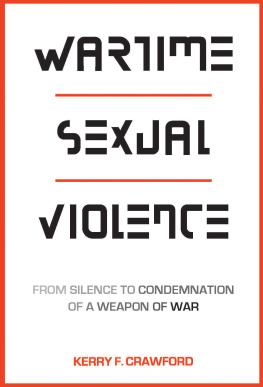
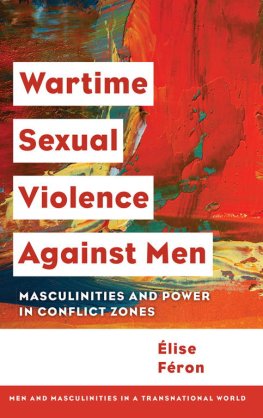
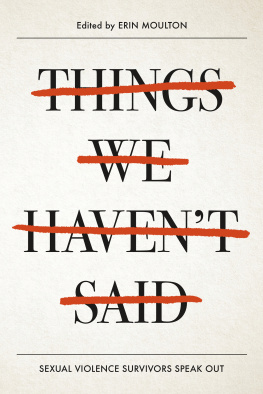
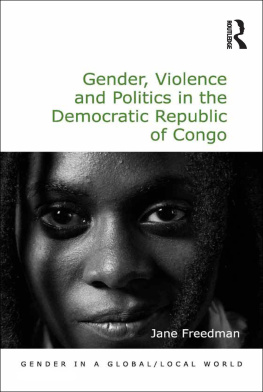
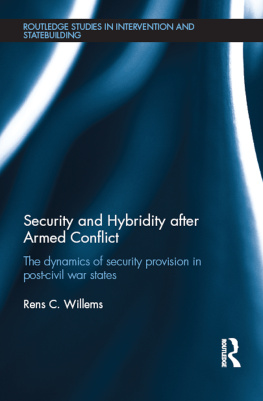
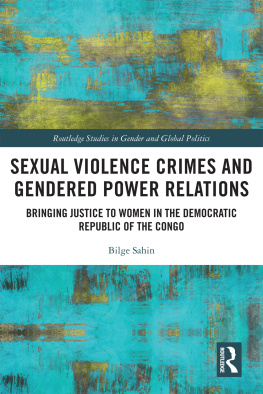
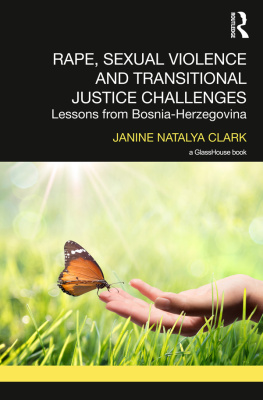


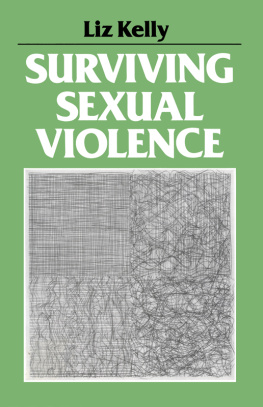
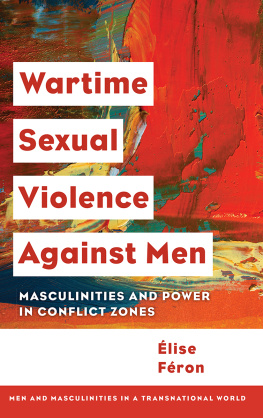
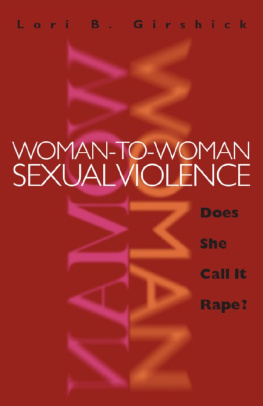

 This book is printed on acid-free paper meeting the requirements of the American National Standard for Permanence in Paper for Printed Library Materials.
This book is printed on acid-free paper meeting the requirements of the American National Standard for Permanence in Paper for Printed Library Materials.